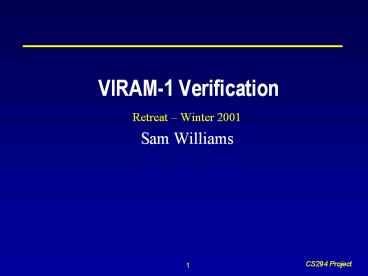VIRAM-1 Verification PowerPoint PPT Presentation
Title: VIRAM-1 Verification
1
VIRAM-1 Verification
- Retreat Winter 2001
- Sam Williams
2
Current Debug / Verification Efforts
- Current
- m5kcfpu program simulation on RTL
- m5kcvuxbardram program simulation on RTL
- AU corner cases random values
- on VERILOG netlist
- To Do
- Entire VIRAM-1 program simulation on RTL
- (m5kcvufpuxbardram)
- Vector Register File only a few cases have
been - (layout) spiced.
3
Verify script
- Command line args include mode, and switches for
disabling state initialization, method for
init/test, run from on/off chip, turn of TLB,
etc - Implemented a trace comparator capable of
handling out of order commit, and partial
execution - few issues need to be hammered out for vu trace
generation - Tests can fail for self-check (software),
unexpected exceptions, simulator failure, traces
not consistent, etc - Since there are currently two different
processors being verified, each had to have its
own verify script and random test generator.
4
Progress
Entire VIRAM-1 Testsuite
vsim
ISA
XCs
Arith. ?Kernels
TLB ?Kernels
random
compiled
m5kc
MIPS Testsuite
Testsuite on Synthesized
FPU Subset of VIRAM-1 Testsuite MIPS FPU
Testsuite
m5kcfpu
ISA
XCs
Arith. ?Kernels
random
compiled
Testsuite on Synthesized
MIPS
Vector Subset of VIRAM-1 Testsuite
m5kcvu xbardram
ISA
XCs
Arith. ?Kernels
TLB ?Kernels
random
compiled
Testsuite on Synthesized
VIRAM-1 (superset of above)
Entire VIRAM-1 Testsuite
Testsuite on Synthesized
- MIPS testsuite is about 1700 test-mode
combinations lt100 FP tests-mode combinations
that are valid for the VIRAM-1 FPU - Additionally, entire VIRAM-1 testsuite has about
2200 tests, each of which can be run in 200 modes
(only 1 mode has been run). Each mode is 24M
instructions, and 4M lines of asm code - Vector unit currently passes about 1800 tests
(only the ISA sub suite) - There are about 200 exception tests for both
coprocessors - Kernel tests are long, but there are only about
100 of them - Tests are continually being written, so that they
are ready once the RTL can run them
5
Test File Format Retrospective
- init/test functions arent written by the test
writter, this allowed them to be switched as
needed. e.g. when vld/vst werent working,
vector register init/test was handled via
vins/vext. The test was identical, all that
changed was a command line option. - xbar had a bug in it which prevented any access
to DRAM (from m5kc or vu). Another command line
allowed running tests from off chip memory, and
forced application of the previous option - Test format allows for easy modification to
reduce simulation time in a debug cycle. - Difficult to apply ISA changes to the entire test
suite. e.g. half as many registers, changes in
functionality for instructions, narrow element
ordering, etc
INIT vr0 half 0x7fff 0x0001 0xffff 0x7fff
0x0001 0xffff 0x7fff 0x0001 0xffff vr1 half
0x7fff 0x7fff 0x7fff 0x0001 0x0001 0x0001 0xffff
0xffff 0xffff CODE li a0,1 vcset
a0,vpw li a0,9 vcset a0,vl
vfclr vf8 vfset vfmask0 vadd.vv
vr2,vr1,vr0 vfor.sv vf16,vs0,vf8
END TEST vr2 half 0xfffe 0x8000 0x7ffe
0x8000 0x0002 0x0000 0x7ffe 0x0000 0xfffe vf16
hex1 d0000000000000000000000000000000
6
Bug Trends
- xbar/DRAM/SysAD timing and arbitration problems
- VERILOG could use extensions for handling control
logic for multiple lanes instead of copying and
modifying code, which led to many typos - Major mistake in xbar functionality had to be
fixed with major memory pipeline change. - A few chaining errors so far
- Tests which had hand coded versions of boot code
were not kept syncd with master version (e.g.
some regs had to be initialized, and were in
master version, but not in the handful of tests
which had their own version) - ISA docs were not kept in sync with RTL, as a
result many tests which look correct failed on
RTL. (vector processing instructions, lack of
interlocks) - FP execution unit as it was shipped to us had
many flaws with respect to exceptions and NaNs
fixed to make it IEEE compliant - FP reorder buffer / CDB problems missing results
- cop0 hazards initially werent reported by vsim,
and caused hard fails on RTL - Instruction Encoding some instructions were
encoded differently in the RTL than what had been
used by the assembler / software simulator
7
VIRAM-1 Board
- Daughter card (modified m5kc core card) has DIMM,
VIRAM-1, and chipset (which maps SysAD?PCI,SDRAM) - Yamon software can be used to directly download
and run programs to daughter card via ethernet or
serial. - An m5kc based core card will allow us to run thru
the methodology before receiving parts. - Atlas board has PCI, compact PCI, SCSI, Parallel,
Ethernet, KB/Mouse, USB, Serial devices. - Will allow for creation of VIRAM-1 workstation
- For OS support, we would have to modify an
unsupported MIPS Linux port. The vector unit can
only touch on chip memory.
8
Still Left To Do
- FPU RTL almost done, needs a little more work.
- VU RTL verification needs to be completed, only
done with ISA - Integrate everything together for VIRAM-1 RTL
model - Include real versions of AU, xbar, VRF
- Iterate over timing driven layout, to ensure
nothing is broken - Board/daughter card checks
- Linux/MIPS port to Linux/VIRAM-1

